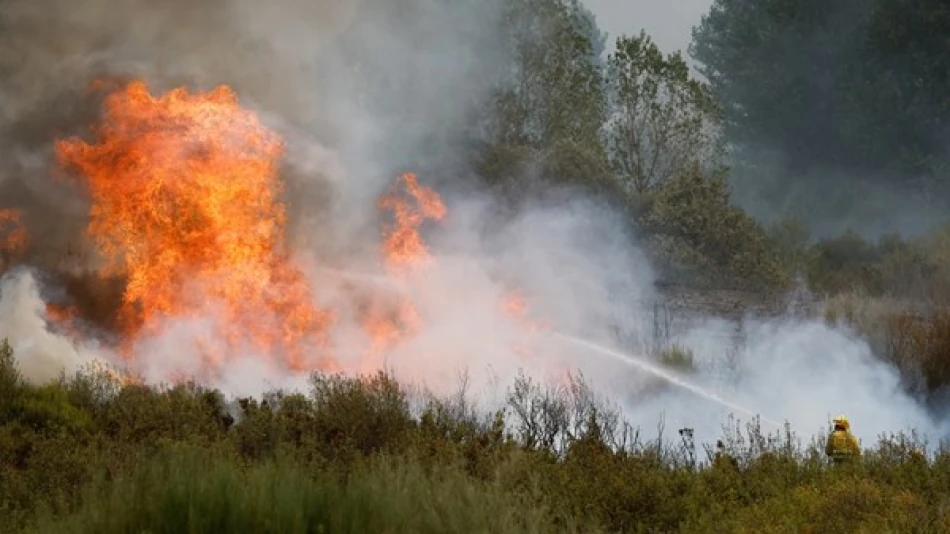
Spain Battles Raging Wildfires: Heroic Efforts to Contain Devastating Blazes
Spain's Wildfire Crisis Deepens as Arson Investigations Launch Amid Record Heat
Spain is grappling with its most severe wildfire outbreak in years, as 14 active blazes have claimed two lives and forced 6,000 residents from their homes. With authorities investigating suspected arson behind several fires and an unprecedented heatwave hampering containment efforts, the crisis highlights Europe's growing vulnerability to extreme weather events that are becoming the new normal.
Death Toll Rises as Fires Spread Across Multiple Regions
The human cost of Spain's wildfire emergency became tragically clear as two fatalities were confirmed across different regions. In Tres Cantos, north of Madrid, a person in their fifties died from severe burns, while León province lost a volunteer firefighter in the line of duty. The Zamora region reports two additional victims in intensive care with serious injuries, underscoring the dangerous conditions facing both residents and emergency responders.
These casualties reflect a broader pattern seen across Mediterranean countries, where wildfire seasons have become increasingly deadly. Spain's death toll, while still lower than Greece's devastating 2018 fires that killed over 100 people, signals the growing human cost of climate-driven extreme weather events.
Arson Investigations Add Criminal Element to Climate Crisis
Minister for Ecological Transition Sara Aagesen's announcement that several fires may be deliberately set introduces a troubling dimension to Spain's natural disaster response. Authorities are now investigating all active fires for potential criminal activity, a move that reflects both the suspicious timing of multiple blazes and Spain's experience with fire-related crimes.
Arson during extreme weather conditions represents a particularly dangerous combination. When temperatures soar and vegetation becomes tinder-dry, even small intentional fires can rapidly spiral beyond control, as seen in California's wine country and Australia's Black Summer fires.
Record Heatwave Creates Perfect Storm for Fire Spread
The underlying driver of Spain's fire crisis is an unusually prolonged heatwave expected to persist until Monday. This extended period of extreme temperatures creates ideal conditions for fire ignition and spread, while simultaneously exhausting firefighting resources and personnel.
Spain's current situation mirrors patterns observed across Southern Europe, where rising average temperatures and longer dry seasons have extended traditional fire seasons. The European Forest Fire Information System has recorded increasing fire activity across the Mediterranean basin, with Spain, Portugal, and Greece bearing the brunt of climate-driven blazes.
Mass Evacuations Strain Emergency Response Systems
The displacement of 6,000 residents overnight demonstrates the scale of Spain's current emergency response challenge. These evacuations, while necessary for public safety, place enormous strain on local resources and highlight the growing frequency with which communities must abandon their homes due to extreme weather events.
This evacuation scale, while significant, pales compared to California's recent fire seasons, where hundreds of thousands have been displaced. However, for Spain, these numbers represent a substantial emergency response operation that tests the country's disaster preparedness infrastructure.
Economic and Environmental Implications
Beyond immediate human costs, Spain's wildfire crisis carries substantial economic implications. The destruction of thousands of hectares of forest and grassland affects agriculture, tourism, and local economies dependent on natural resources. Insurance claims from property damage, combined with firefighting costs and post-fire rehabilitation expenses, will likely reach tens of millions of euros.
The environmental impact extends beyond immediate destruction. Forest fires release stored carbon, contributing to climate change, while destroying ecosystems that take decades to recover. Spain's burned areas will require extensive reforestation efforts, assuming climate conditions allow successful replanting.
Looking Forward: Adaptation Becomes Imperative
Spain's current crisis reinforces the urgent need for enhanced fire prevention and response strategies. Countries like Portugal have invested heavily in early warning systems and community preparedness following their own devastating fire seasons, offering potential models for Spanish authorities.
The investigation into potential arson also highlights the need for stronger legal deterrents and surveillance in high-risk areas during extreme weather periods. As climate change makes such conditions more frequent, Spain must balance natural disaster response with criminal prevention efforts to protect both lives and landscapes.
Most Viewed News

 Layla Al Mansoori
Layla Al Mansoori






